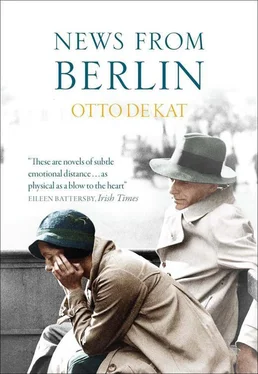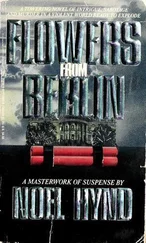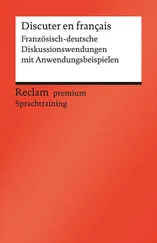In the street beneath them life went on as usual with its everyday sounds, with sunshine and the screech of gulls high above the buildings. He touched the sleeve of her cardigan, pressed her arm. Kate had a strange sensation of blankness in her head, could feel the blood rising to her cheeks. It was as if somewhere far away, in the unconscionable depths of her being, parcels were being unwrapped, mysterious envelopes torn open, stacks of papers riffled through. Why was it just as if Roy was sitting there, clasping her arm? Roy, who had been dead for so long, and buried in a bottomless pit. The Roy of all those mornings on their balcony in Rome, just off the Corso.
“I’ve sat down, Kate, come and join me.” The invariable invitation. Ten o’clock in the morning, church bells ringing out all around them, a fraction off synchrony. Always lovely weather, always together. In his arms, beneath him, on his knee, his hands in hers, his body in complete abandon. Nothing lasts, nothing stays the same, nothing is lost. Where had they been that last time? She thought it was the Caffè Greco, the café which had become too highly recommended in the guidebooks, but which was largely unspoilt in their day. They had stopped there on their walk to the railway station. He would be away for a couple of days, she would not accompany him. The café was all but deserted at this early hour. They chose a two-seat banquette upholstered in purple velvet, the cardinal among café furniture. A clutter of small tables, mirrors, paintings, chairs, created an obstacle course for the waiters. Their evenings in Caffè Greco, when it was packed with people, all Italians, all discussions and laughter and gesticulations, how Roy and she loved going there.
The heat had been intense that morning, the ceiling fan whirring to little effect. They had sat there as though it were the train compartment in which Roy would soon depart, first class. Kate held both her hands clasped round his upper arm, as she often did. To him the most endearing of her gestures. They had said little, just stared into the heat, idly aware of the people trickling in. Roy had stroked her hair. There was nothing in the least unusual or untoward, they were in ample time for Roy’s train, just two days and he would be back with her again. From Rome to Milan and back. He was to address “a bunch of diggers” on recent developments at the Forum excavations, and he also had an appointment with a Dutch journalist whose name escaped him, but whom he would see in his hotel.
Thus their hour in the café had passed, after which they resumed their walk, holding hands probably, to the Stazione Termini, where a porter had taken charge of his bag. Had she accompanied him down the platform? She thought not. She disliked waving goodbye on platforms. There had been no high-flown words on parting – why would there be? Just a kiss on her mouth.
Suddenly, Kate felt the pressure of his hand on her arm. Matteous.
They were flying at night, which was not normal practice. Neutral airlines flew during daylight hours, out in the open, so the Luftwaffe would not mistake them for the enemy. The sun was rising as they prepared for landing on the airfield at Bristol. Oscar was asleep. He was jolted awake as the wheels of the aircraft hit the tarmac. That had never happened to him on a plane before. His nerves jangled. First he would call Morton, he thought, then go to Kate’s flat. He wanted to surprise her.
Bristol, six a.m., Whitchurch Airport. The hands of the giant clock in the arrivals hall stood as stiffly to attention as the guards at Buckingham Palace. Oscar had plenty of time. He took the train to Paddington. Morton was expecting him, but there was no point in presenting himself at the ministry before nine. He did not really want to go there at all; he would ask Morton to meet him elsewhere. He closed the narrow door of his compartment. In England he always had the feeling of travelling on a private train, as if yours was the only compartment behind the engine. There was no corridor, no door to the adjoining compartment, no ticket collector. Ten people in a plush-lined box, a chocolate box on wheels. The first train of the day was still fairly empty, and the only other person in the compartment was a young soldier sitting by the window. Beside him was a large kitbag with his army greatcoat draped over it. Oscar saw two closed eyes in a pale, unshaven face. A desolate sight. Everything was desolate: the dark roof of the station, the slow tread of the stationmaster, the blurred, metallic tannoy announcing departure. Oscar saw a few late-comers running along the platform and leaping onto the train.
Lately he had spent more time travelling on trains than ever before. Since their days in the mountains he had seen Lara several times, taking turns to meet at his home in Berne and at hers in Fribourg. The first time was a week after they had separated. He picked her up at the station in Berne. How were her binoculars, he wanted to know.
“Idle, sitting on their ledge by the window,” was her prompt reply.
To see her again – since their departure from the Oberland he had been able to think of very little else. In Berne, too, the snow was piled high in the streets, but it was nothing compared to their village up the mountain. Oscar took her to Della Casa, an inconspicuous restaurant in the Schauplatzgasse within walking distance of the station. He had lunch there sometimes with Swiss contacts, it was “spy-proof”, and unknown to German agents, apparently. The proprietor was a “good” Swiss.
“Herr Verschuur, welcome! It has been a while since you were here last – how good to see you.” The waiter’s warmth was sincere. He bowed to Lara, took her coat and Oscar’s, and led them to a table in a separate angle by the Russian stove. From the kitchen in the back came the rattle of pans and crockery. The small dining room was still empty of clients, but would soon fill up, and by two o’clock they would all be gone again. Rhythms of peacetime.
At first, all he could do was look at her. She did not seem to mind this, it was as though she understood. She said as little as he did. Oscar and Lara, in the glassy quiet of their niche.
She allowed him to observe her. He found her breathtaking, of a beauty so new to him that it was almost frightening. In the sequestered world of the mountain village he had been less conscious of it than here, on a weekday in the city. That she had made the journey especially to meet him, that she wanted to see him again, that she had taken the train, put lipstick on, ironed her blouse, glanced in the mirror before she left – unbelievable. He floundered for words.
“I was up in the mountains every day.” Oscar’s voice was hesitant and low, as though afraid of being overheard. “Doing all the walks in my head that we would have done had we stayed.”
“I was there too. I followed you from the terrace, but you were impossible to catch up with, a bit like those chamois.”
They had left the Jungfrau behind unscathed, the village had not been cut off. Unscathed? Ha, anything but. In their minds they had been cleaved together. They resumed their oblique declarations of love.
At half past twelve the regulars started to drift in, long-time patrons whom the waiter dispersed across the homely dining area with practised efficiency. Soon all the tables were occupied, and the air was alive with the gurgles of Swiss German. The conviviality that prevailed, the effusive waiter, the sensible eaters, the bountifulness and contentment – Oscar saw and heard it all, yet he was hearing other things: sirens over London, sirens over Berlin.
He told Lara about his eternal struggle with the feeling of being in one place and simultaneously in another. Being able to talk with her, and at the same time with someone else, his daughter Emma for instance. Lara nodded. Not-quite-blue was the colour of her eyes, or rather a soft green, the shade of the earliest spring. In Café Eiger they had been bluer; here in the city they were more green. Here everything about her was a shade different from the way it had been in the mountains. Ski trousers, jumpers, jackets and gloves, they had been nothing but camouflage, disguise.
Читать дальше












